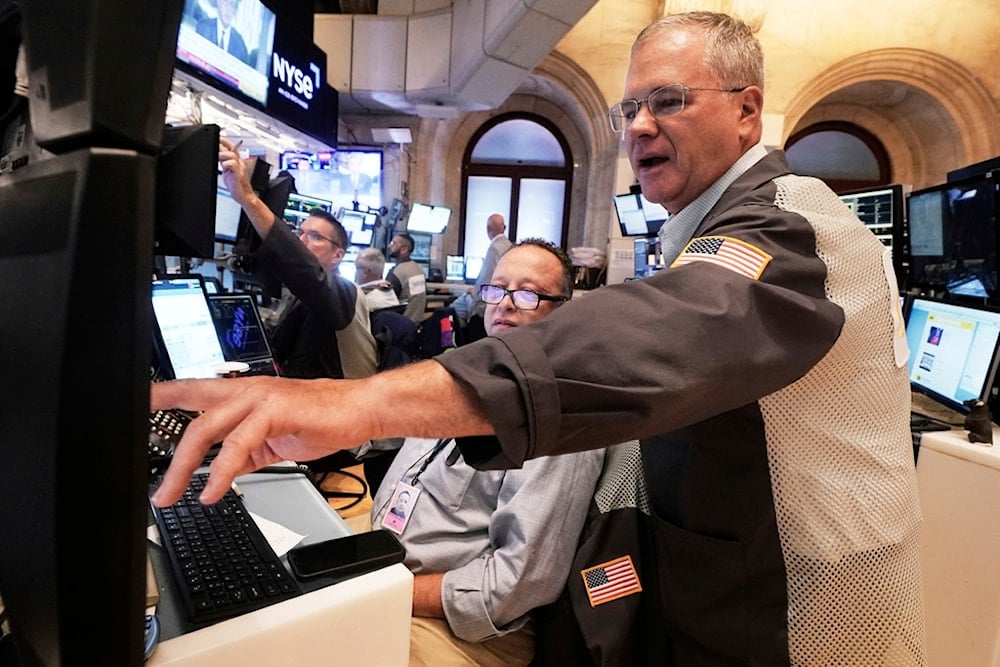Global stocks sink as gold hits record amid Fed, tariff fears
Global markets slumped and gold hit record highs as investor fears over Trump's Fed shake-up, tariff disputes, and European fiscal strains drove a flight to safe havens.
-

Traders Bryan Masseria, center, and Columb Lytle, right, works on the floor of the New York Stock Exchange, Monday, Aug. 18, 2025. (AP Photo/Richard Drew)
Stock markets fell sharply on Tuesday while gold surged to unprecedented levels, as investors flocked to safe havens amid mounting concerns over US political interference in monetary policy, uncertainty around tariffs, and mounting fiscal strains in Europe.
Wall Street returned from the Labor Day holiday to steep losses, with the S&P 500 down 1.4%, the Dow sliding 1.1%, and the Nasdaq off 1.7%. In Europe, Frankfurt's DAX dropped 2.3%, though still up 18% for the year, while London's FTSE shed nearly one percent. Bond yields spiked, pushing up borrowing costs in the US, France, and the UK.
Speaking to AFP, Kathleen Brooks, research director at XTB, observed that September often brings weakness in equities. "However, a selloff in the bond market and a rush to the dollar and gold are signs that investors are rushing into safe havens and liquid assets," she said.
Gold prices leapt to $3,501.59 an ounce, narrowly topping April's record, before climbing further in late trading to $3,524.27. Analysts attribute the rally not only to market jitters but also to expectations of US rate cuts, a weakening dollar, and strong central bank demand, particularly from China. Forecasts now suggest gold could test $3,600 to $3,900, with some projections pointing toward $4,000 by 2026.
Chris Beauchamp, chief analyst at IG, noted, "Markets often see a burst of volatility after US holidays, but today seemed to have something more about it, as European markets nose dived in early trading and bond yields continued to rise."
Fed independence questioned
Investor unease intensified as President Donald Trump pursued the removal of Federal Reserve Governor Lisa Cook, a move widely seen as undermining the central bank's independence. A court heard Cook's legal challenge on Tuesday, underscoring what analysts view as a high-stakes clash over the Fed's autonomy. "Investors are increasingly concerned about President Trump's interference with the running of the US Federal Reserve," David Morrison, senior analyst at Trade Nation, told AFP.
The controversy comes alongside heightened speculation of Fed rate cuts, with Governor Christopher Waller signaling support for reductions beginning in September and extending into the next six months. While markets welcomed dovish signals, political pressure on the Fed rattled confidence.
Tariff disputes and European strains
Uncertainty around Trump's tariff campaign added to the volatility. A federal court recently ruled that many of his duties were unlawful, though it allowed them to remain in place until mid-October pending appeal. Morrison warned, "This combination of tariff uncertainty, Fed concerns, and seasonal weakness left markets on edge as the month began."
In Europe, French bond yields surged to their highest since the 2011 eurozone debt crisis, just as Prime Minister François Bayrou faces a crucial confidence vote next week over his government's budget. In Britain, 30-year bond yields climbed to levels unseen since 1998, deepening worries about the UK's sluggish economy.
Energy and corporate moves
Oil prices rose on stalled Ukraine–Russia peace talks, reinforcing energy market concerns. On the corporate front, Nestlé shares fell 0.7% after the food giant abruptly dismissed CEO Laurent Freixe over a workplace relationship.
Read more: 'Serious danger' if Trump controls US monetary policy: ECB

 3 Min Read
3 Min Read










